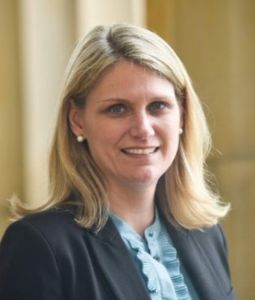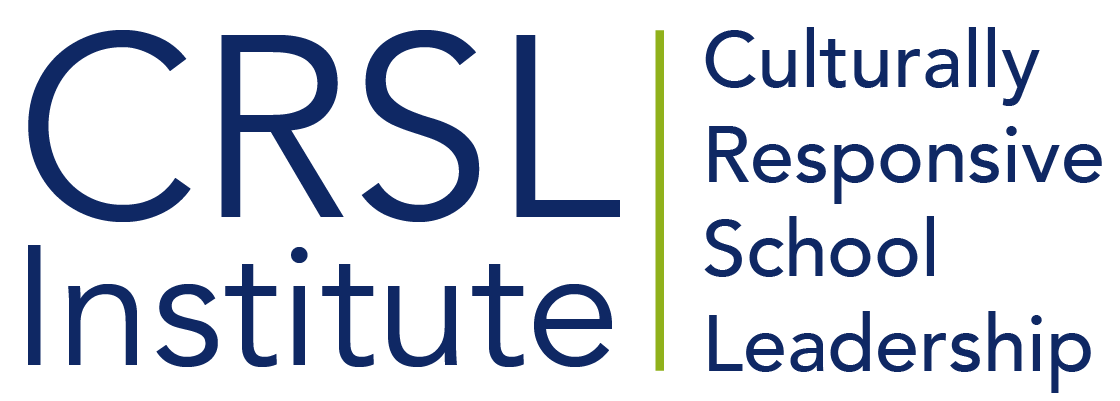Privacy policy
This Policy applies as between you, the User of this Web Site and CRSLI - Culturally Responsive School Leadership Institute the owner and provider of this Web Site. This Policy applies to our use of any and all Data collected by us in relation to your use of the Web Site and any Services or Systems therein.
1. Definitions and Interpretation
In this Policy the following terms shall have the following meanings:
"Account": means collectively the personal information, Payment Information and credentials used by Users to access Material and / or any communications System on the Web Site;
"Content": means any text, graphics, images, audio, video, software, data compilations and any other form of information capable of being stored in a computer that appears on or forms part of this Web Site;
"Cookie": means a small text file placed on your computer by CRSLI - Culturally Responsive School Leadership Institute Ltd when you visit certain parts of this Web Site. This allows us to identify recurring visitors and to analyse their browsing habits within the Web Site.
"Data": means collectively all information that you submit to the Web Site. This includes, but is not limited to, Account details and information submitted using any of our Services or Systems;
"CRSLI - Culturally Responsive School Leadership Institute": means CRSLI - Culturally Responsive School Leadership Institute, ADDRESS;
"Service": means collectively any online facilities, tools, services or information that CRSLI - Culturally Responsive School Leadership Institute makes available through the Web Site either now or in the future;
"System": means any online communications infrastructure that CRSLI - Culturally Responsive School Leadership Institute makes available through the Web Site either now or in the future. This includes, but is not limited to, web-based email, message boards, live chat facilities and email links;
"User" / "Users": means any third party that accesses the Web Site and is not employed by CRSLI - Culturally Responsive School Leadership Institute and acting in the course of their employment; and
"Website": means the website that you are currently using (www.crsli.org) and any sub-domains of this site (e.g. subdomain.yourschool.com) unless expressly excluded by their own terms and conditions.
2. Data Collected
Without limitation, any of the following Data may be collected:
- 2.1 name;
- 2.2 date of birth;
- 2.3 job title & profession;
- 2.4 contact information such as email addresses and telephone numbers;
- 2.5 demographic information such as post code, preferences and interests;
- 2.6 financial information such as credit / debit card numbers;
- 2.7 IP address (automatically collected);
- 2.8 web browser type and version (automatically collected);
- 2.9 operating system (automatically collected);
- 2.10 a list of URLS starting with a referring site, your activity on this Web Site, and the site you exit to (automatically collected); and
- 2.11 Cookie information (see Clause 10 below).
3. Our Use of Data
- 3.1 Any personal Data you submit will be retained by CRSLI - Culturally Responsive School Leadership Institute for as long as you use the Services and Systems provided on the Web Site. Data that you may submit through any communications System that we may provide may be retained for a longer period of up to one year.
- 3.2 Unless we are obliged or permitted by law to do so, and subject to Clause 4, your Data will not be disclosed to third parties. This includes our affiliates and / or other companies within our group.
- 3.3 All personal Data is stored securely in accordance with the principles of the Data Protection Act 1998. For more details on security, see Clause 9 below.
- 3.4 Any or all of the above Data may be required by us from time to time in order to provide you with the best possible service and experience when using our Web Site. Specifically, Data may be used by us for the following reasons:
- 3.4.1 internal record keeping;
- 3.4.2 improvement of our products / services;
- 3.4.3 transmission by email of promotional materials that may be of interest to you;
- 3.4.4 contact for market research purposes which may be done using email, telephone, fax or mail. Such information may be used to customise or update the Web Site.
4. Third Party Web Sites and Services
CRSLI - Culturally Responsive School Leadership Institute may, from time to time, employ the services of other parties for dealing with matters that may include, but are not limited to, payment handling, delivery of purchased items, search engine facilities, advertising and marketing. The providers of such services do not have access to certain personal Data provided by Users of this Web Site. Any Data used by such parties is used only to the extent required by them to perform the services that CRSLI - Culturally Responsive School Leadership Institute requests. Any use for other purposes is strictly prohibited. Furthermore, any Data that is processed by third parties must be processed within the terms of this Policy and in accordance with the Data Protection Act 1998.
5. Changes of Business Ownership and Control
- 5.1 CRSLI - Culturally Responsive School Leadership Institute may, from time to time, expand or reduce its business and this may involve the sale of certain divisions or the transfer of control of certain divisions to other parties. Data provided by Users will, where it is relevant to any division so transferred, be transferred along with that division and the new owner or newly controlling party will, under the terms of this Policy, be permitted to use the Data for the purposes for which it was supplied by you.
- 5.2 In the event that any Data submitted by Users will be transferred in such a manner, you will be contacted in advance and informed of the changes. When contacted you will be given the choice to have your Data deleted or withheld from the new owner or controller.
6. Controlling Access to your Data
- 6.1 Wherever you are required to submit Data, you will be given options to restrict our use of that Data. This may include the following:
- 6.1.1 use of Data for direct marketing purposes; and
- 6.1.2 sharing Data with third parties.
7. Your Right to Withhold Information
- 7.1 You may access certain areas of the Web Site without providing any Data at all. However, to use all Services and Systems available on the Web Site you may be required to submit Account information or other Data.
- 7.2 You may restrict your internet browser’s use of Cookies. For more information see Clause 10 below.
8. Accessing your own Data
- 8.1 You may access your Account at any time to view or amend the Data. You may need to modify or update your Data if your circumstances change. Additional Data as to your marketing preferences may also be stored and you may change this at any time.
- 8.2 You have the right to ask for a copy of your personal Data on payment of a small fee.
9. Security
Data security is of great importance to CRSLI - Culturally Responsive School Leadership Institute and to protect your Data we have put in place suitable physical, electronic and managerial procedures to safeguard and secure Data collected online.
10. Changes to this Policy
CRSLI - Culturally Responsive School Leadership Institute reserves the right to change this Privacy Policy as we may deem necessary from time to time or as may be required by law. Any changes will be immediately posted on the Web Site and you are deemed to have accepted the terms of the Policy on your first use of the Web Site following the alterations.
11. Contacting Us
If there are any questions regarding this privacy policy you may contact us at members@crsli.org
Follow us on social
Empty space, drag to resize
Where we are
1041 Grand Ave Box #276
St. Paul, MN 55105
612.584.9478
info@crsli.org
St. Paul, MN 55105
612.584.9478
info@crsli.org
Featured links
Policy Pages
Connect with us
Subscribe to our email list
Thank you!
Copyright © 2025
Empty space, drag to resize

Empty space, drag to resize
Muhammad Khalifa, PhD
President and CEO
Dr. Muhammad Khalifa is a professor of educational administration and Executive Director for Urban Education Initiatives at the Ohio State University. Before coming to OSU, Dr. Khalifa held the Robert Beck Endowed Professorship in the Department of Organizational Leadership, Policy, and Development at the University of Minnesota, Twin Cities. Having worked as a public school teacher and administrator in Detroit, Dr. Khalifa's research examines how urban school leaders enact culturally responsive leadership practices. His latest book, Culturally Responsive School Leadership (2018) was published by Harvard Education Press. He has led equity audits in U.S. schools as a way to reduce achievement and discipline gaps, and he is the first to develop and use online Equity Audits for schools. In addition to his urban work in the U.S., Dr. Khalifa has engaged in school leadership reform in African and Asian countries, including a recent U.N. project in East Africa.
Empty space, drag to resize
Empty space, drag to resize

Empty space, drag to resize
Darlinda Anderson
Senior Vice President
Darlinda Anderson serves as the senior vice president of Ajusted Equity Solutions/CRSLI. Her role within the organization is to charter leadership, organizational objectives, sustainable strategy, and advantageous expansion. For the last twenty years, she has worked in human resource management, K–12 education, and process-led project management. Overall, Darlinda’s passion for balance and equity in the service of societal disparities—especially those in disadvantaged groups and professions—was the start of her overarching search for finding and supporting an organization that creates long-term sustainable opportunity for disadvantaged minorities.
Because of her passion for systems and organizational development, after graduating from Purdue University, Darlinda went to work for Hewitt Associates, a global leader in human resources outsourcing and programmatic financial services. This was her segue into the fields of project management, education, interactive broadcast media, and marketing. Though she initially started in business within the healthcare sector, it allowed her to realize how deeply she loved working in the service of others and for an equitable cause. This was the beginning of her journey to earning her master's in educational leadership. As her multiple career paths progressed, Darlinda searched for an opportunity to serve with the US government agency Americorps. There, she completed her educational service through Teach for America. Darlinda continued to serve as a K–12 public education teacher after her initial service to Americorps ended for another ten plus years.
As a classroom teacher, Darlinda saw firsthand all the struggles that Title I schools faced. After becoming a department chair, she began studying full-time to earn her master’s of business administration in human resource management. She continued to seek out opportunities beyond the classroom, where she knew she’d be closer to influencing systematic and district-level change. She continued navigating impactful roles that affected internal shifts, which led to working as a district program manager for a few years and later leading as a director of programs over the span of the next few years in educational organizations across the country. Today, her overall goal is to continue to serve, cultivate, and create world-changing avenues that make far-reaching equitable ideals a reality.
Empty space, drag to resize
Empty space, drag to resize

Empty space, drag to resize
Empty space, drag to resize
Jessica Schrody
Marketing Administrative Specialist
Jessica Schrody, born and raised in Los Angeles, California, is a professional with a passion for digital storytelling and online marketing since 2017. Focused on social media, she crafts engaging narratives that captivate audiences and drive business success.
Beyond her digital expertise, Jessica has a solid background in customer service and a talent for high-ticket, high-volume sales. Her commitment to excellence and dynamic range of skills make her a valuable asset who routinely contributes to the company’s growth.
Empty space, drag to resize
Empty space, drag to resize

Empty space, drag to resize
Katie Pekel, EdD
Co-Director CRSLA
Dr. Katie Pekel, is the Principal in Residence for the University of Minnesota. In this role Dr. Pekel serves as the department’s direct connection between the fields of research and practice in PK-12 education. She leads the Minnesota Principals Academy, co-directs the Urban Leadership Academy, developed the University’s District Leadership Academy with Dr. Kim Gibbons and the Culturally Responsive School Leadership Academy with colleague Dr. Muhammad Khalifa. Dr. Pekel also serves as a graduate coordinator or the Educational Policy and Leadership track within the Department of Organizational Leadership, Policy and Development. She teaches courses for aspiring school principals and doctoral students and coordinates the Executive PhD cohort for educational leaders. Dr. Pekel has also worked with the University’s College Readiness Consortium guiding school principals and leadership teams from over 150 schools across Minnesota on their implementation of Ramp-Up to Readiness™, the University’s school-wide college readiness program for students in grades 6-12. Dr. Pekel has served at all levels of K-12 education first as a high school English teacher, as an elementary principal and most recently as a middle school principal for six years in Austin, MN.
Empty space, drag to resize
Empty space, drag to resize

Empty space, drag to resize
Maggie Smith-Peterson, PhD
Director of Instructional Design & Learning
Maggie Smith-Peterson is the Director of Instructional Design & Learning for the Culturally Responsive School Leadership Institute and leads projects focused on the creation and expansion of learning experiences, services and tools for developing socially just and racially equitable leaders and school systems. Maggie has served as an elementary classroom teacher, specialist/coach, adjunct professor, district program facilitator, and professional learning designer in a variety of school systems and organizations, including New York City Public Schools, St. Paul Public Schools, Minneapolis Public Schools, the University of Minnesota, and the University of St. Thomas. Maggie holds an M.S. and an M.A. in education, and received her Ph.D. in Curriculum and Instruction from the University of Minnesota. As a scholar, she studies social justice issues in gifted education and advanced academics with a particular focus on the history of scientific racism and its implications for structural reproduction. As a designer, Maggie specializes in visual and multimedia design, UX/LX research and design, and learning technologies.
Empty space, drag to resize
Empty space, drag to resize

Empty space, drag to resize
Noor Doukmak, PhD
Director of Operations & Community Partnerships
Noor Doukmak is the Director of Operations & Community Partnerships at the Culturally Responsive School Leadership Institute. She channels her passion for educational equity and excellence into creating research-based content for practitioners, collaborating with school and district leaders to support their equity initiatives, and facilitating smooth operations across CRSLI’s projects.
Noor leverages her diverse background as a high school math educator, university instructor, editorial assistant, and education researcher. She earned her PhD in Education Policy, Organization and Leadership from the University of Illinois Urbana-Champaign, where her research focused on community-organized education.
Empty space, drag to resize
Empty space, drag to resize

Empty space, drag to resize
Course 1: Historical & Community-Based Epistemology
The first course in ATA SY25 series delves into historical continuities and community-based perspectives that are often invisibilized in our systems, practices, and ways of working in educational contexts. Through this course, leadership teams establish foundational knowledge and skills to visibilize historical discourses and cultural blindspots operating in our schools today.
Empty space, drag to resize
Sessions:
-
Session 1 - Colonial Discourses: Analyze the historical continuities of deficitizing beliefs about minoritized students and families by examining colonial discourses.
-
Session 2 - Historicizing Community Context: Historicize the conditions and events that have impacted your school system's minoritized communities over time.
-
Session 3 - Understanding Epistemology: Define epistemology and visibilize its variances within both dominant and minoritized communities and cultures.
-
Session 4 - Community-based vs. School-centric Epistemology: Differentiate between school-centric and community-based epistemologies.
Empty space, drag to resize
Empty space, drag to resize

Empty space, drag to resize
Course 2: Leadership for Critical Reflection
Critical reflection is a cornerstone of culturally responsive school leadership. Yet too often, critical reflection fails to transcend the personal level and lead to effective, ethical action. In this course, leadership teams will not only learn to develop and lead personal critical self-reflection practices, but also to expand leadership of critical reflection to the systems-level by incorporating community, interrogating structures, and institutionalizing practices.
Empty space, drag to resize
Sessions:
-
Session 1 - Developing a Personal Critical Reflection Practice: Recognize and self-assess the essential leadership skills for personal critical self-reflection.
-
Session 2 - Leading Dynamic Critical Reflection: Engage critical reflection beyond the personal level by examining the structures, practices, experiences, and content used in school(s).
-
Session 3 - Leading Community-Centered Critical Reflection: Implement a plan to include the perspectives of minoritized students, families, and communities in leadership of critical reflection.
-
Session 4 - Institutionalizing Critical Reflection: Develop a roadmap for embedding critical reflection dynamically across your system, among multiple stakeholders, and over time.
Empty space, drag to resize
Empty space, drag to resize

Empty space, drag to resize
Course 3: Leading Inclusive Schools
Many of the seemingly intractable racial disparities in discipline and academics that we see nationwide are a result of exclusionary practices that marginalize minoritized students' ways of knowing and being. In this course, you will learn to recognize and challenge the exclusionary school practices that tend to be directed at minoritized students. You'll interrogate restorative disciplinary models and develop a culturally responsive approach to student behavior. And you'll learn how to mentor teachers and model inclusionary practices to foster an environment where all students feel seen, safe, and excited to learn.
Empty space, drag to resize
Sessions:
-
Session 1 - Inclusionary vs. Exclusionary Practices: Identify and differentiate between exclusionary and inclusionary practices.
-
Session 2 - Challenging Exclusionary Practices: Use mentoring and modeling to transition educators out of exclusionary practices and into inclusionary responses to student behaviors.
-
Session 3 - Restorative Discipline: Critique common disciplinary frameworks by identifying the ways in which they fail to disrupt exclusionary practices.
-
Session 4 - Community-Based Behavior Modification: Synthesize understandings of inclusionary practices by developing a framework for community-based behavior modification.
Empty space, drag to resize
Empty space, drag to resize

Empty space, drag to resize
Course 4: Humanizing Student Identity
In order for our schools to be truly welcoming and supportive of minoritized children and youth, we must create intentional spaces in which they can show up as their authentic, cultural selves. This requires that culturally responsive school leaders develop deep understandings of and respect for local minoritized community cultures. In this final course of the SY25 ATA series, leaders will not only learn how to humanize minoritized students’ cultural ways of knowing and being, but also to create systems and structures that transform teaching, learning and community engagement.
Empty space, drag to resize
Sessions:
-
Session 1 - Visibilizing Dehumanization: Understand community-based identities and visibilize practices that dehumanize them.
-
Session 2 - Developing Social Capital Networks: Establish social capital networks that leverage school resources and staff to empower parents and cultivate relationships.
-
Session 3 - Centering Students' Cultural Capital: Create a plan to allow teachers and other school staff to identify and use minoritized students' cultural capital.
-
Session 4 - Leading Humanizing Schools: Systematize approaches to harnessing cultural and social capital to resolve equity issues in schools.
Empty space, drag to resize
Enroll in After the Academy
Please complete the following form. After submitting a member of our team will reach out to you with next steps within 1-3 business days.
